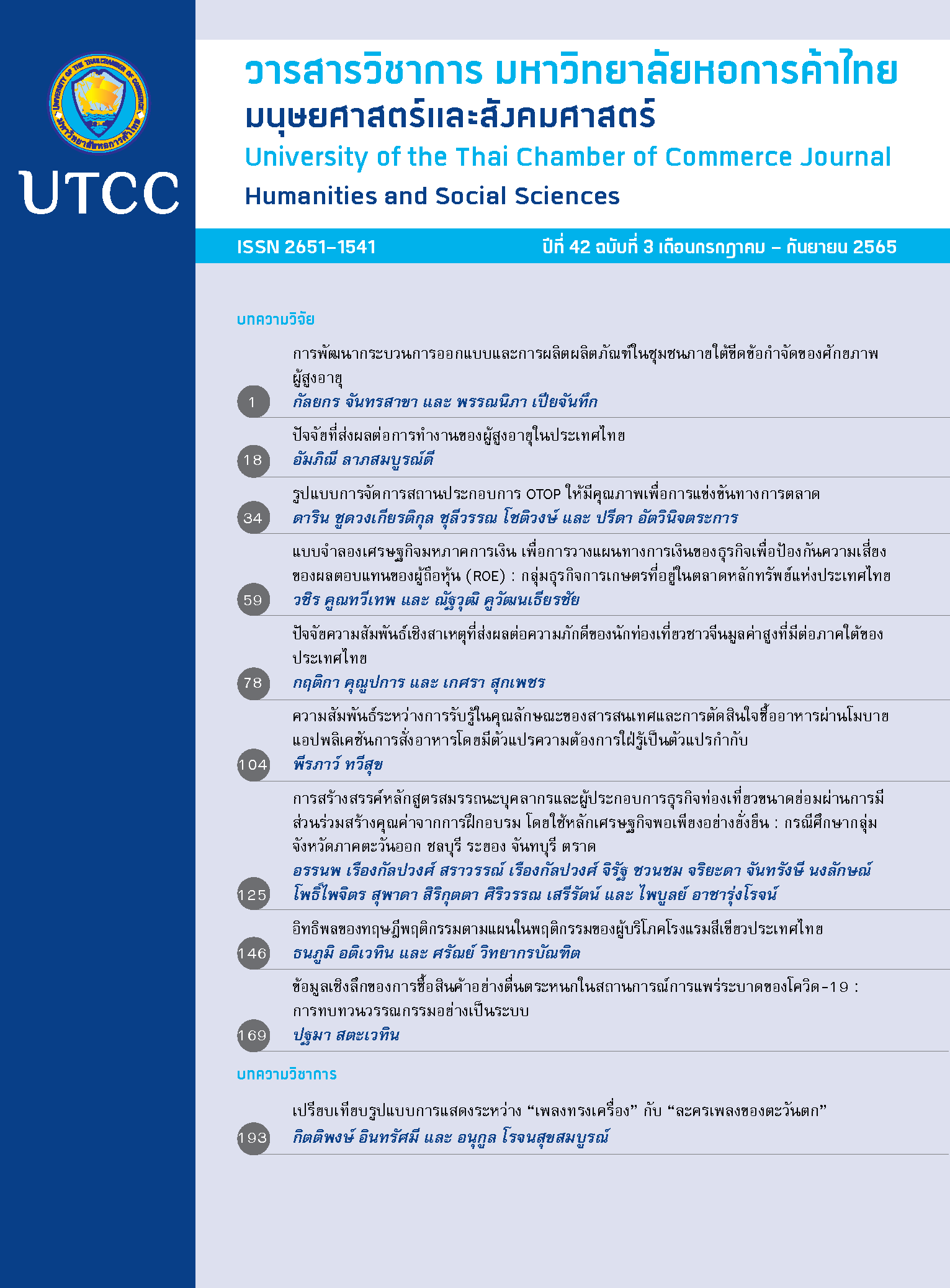เปรียบเทียบรูปแบบการแสดงระหว่าง “เพลงทรงเครื่อง” กับ “ละครเพลงของตะวันตก”
Main Article Content
บทคัดย่อ
บทความนี้มีจุดประสงค์เพื่อเปรียบเทียบรูปแบบของการแสดงเพลงทรงเครื่องกับละครเพลงตะวันตก
(Musical Theatre) โดยวิเคราะห์ความเหมือนและความต่างของการแสดงตามลำดับการปรากฏบนเวที
ผลการศึกษา พบว่า รูปแบบของการแสดงมีความเหมือนกัน คือ มีการแบ่งเป็น 3 ช่วง ช่วงก่อนเริ่มการแสดง
ช่วงการแสดง และช่วงก่อนจบการแสดง ซึ่งแต่ละช่วงมีรายละเอียดในการนำเสนอแตกต่างกัน ช่วงที่1ละครเพลง
มีการบรรเลงโหมโรง เพลงทรงเครื่องมีการเล่นเพลงฉ่อยหรือบรรเลงเพลงวา ช่วงที่2ละครเพลงบรรเลงดนตรี
พร้อมเต้นรำระหว่างเปลี่ยนฉากเพลงทรงเครื่องใช้นักแสดงเล่าเรื่องราวเชื่อมโยงฉากถัดไป ส่วนช่วงที่3 นำเสนอ
จุดคลี่คลายของเรื่องราวเหมือนกัน ด้านความแตกต่าง คือการแสดงเพลงทรงเครื่องพัฒนามาจากเพลงพื้นบ้าน
ภาคกลางของไทย ส่วนละครเพลงพัฒนามาจากการแสดงอุปรากรของอิตาลีดังนั้น แม้ว่าบริบททางวัฒนธรรม
การแสดงแตกต่างกัน แต่รูปแบบของการแสดงสามารถเหมือนพ้องต้องกันได้ในฐานะสื่อสร้างความบันเทิง
Article Details

อนุญาตภายใต้เงื่อนไข Creative Commons Attribution-NonCommercial-NoDerivatives 4.0 International License.
ลิขสิทธิ์ของบทความ
ผลงานที่ได้รับการตีพิมพ์ถือเป็นลิขสิทธิ์ของมหาวิทยาลัยหอการค้าไทย ห้ามมิให้นำเนื้อหา ทัศนะ หรือข้อคิดเห็นใด ๆ ของผลงานไปทำซ้ำ ดัดแปลง หรือเผยแพร่ ไม่ว่าทั้งหมดหรือบางส่วนโดยไม่ได้รับอนุญาตเป็นลายลักษณ์อักษรจากมหาวิทยาลัยหอการค้าไทยก่อน
เอกสารอ้างอิง
เกลียว เสร็จกิจ. (ผู้แสดงนำ). (2553, 6 กรกฎาคม). พระอภัยมณี(พ.ศ. 2553) [เพลงทรงเครื่อง]. กรุงเทพฯ: มหาวิทยาลัยหอการค้าไทย.
เกลียว เสร็จกิจ. (ผู้แสดงนำ). (2560, 28 กรกฎาคม). เรื่องสังข์ทอง (พ.ศ. 2560) [เพลงทรงเครื่อง]. กรุงเทพฯ: ศูนย์มานุษยวิทยาสิรินธร (องค์การมหาชน).
เกลียว เสร็จกิจ. (ผู้แสดงนำ). (2562, 14 กรกฎาคม). นางสิบสอง–พระรถเมรี(พ.ศ. 2562) [เพลงทรงเครื่อง]. กรุงเทพฯ: ศูนย์มานุษยวิทยาสิรินธร (องค์การมหาชน).
จารุณีหงส์จารุ. (2561). ดุษฎีนิพนธ์นาฏยดุริยางค์: “ธีรราชา” นวัตกรรมละครเพลงร่วมสมัยไทย (วิทยานิพนธ์ ปริญญาดุษฎีบัณฑิต, จุฬาลงกรณ์มหาวิทยาลัย). สืบค้นจาก http://cuir.car.chula.ac.th/handle/123456789/73160
ถกลเกียรติวีรวรรณ (ผู้จัด). (2556, 9 พฤษภาคม). Beauty and the Beast [ละครเวที]. กรุงเทพฯ: โรงละครเมืองไทยรัชดาลัย เธียเตอร์.
ถกลเกียรติวีรวรรณ. (ผู้จัด). (2558, 28 กุมภาพันธ์). The Phantom of the Opera [ละครเวที]. กรุงเทพฯ: โรงละครเมืองไทยรัชดาลัย เธียเตอร์.
ถกลเกียรติวีรวรรณ (ผู้จัด). (2562, 10 ตุลาคม). The Lion King [ละครเวที]. กรุงเทพฯ: โรงละครเมืองไทยรัชดาลัย เธียเตอร์.
มนตรีตราโมท. (2540). การละเล่นของไทย (พิมพ์ครั้งที่ 2). กรุงเทพฯ: พิฆเณศ พริ้นท์ติ้ง เซ็นเตอร์.
มัทนีรัตนิน. (2546). ความรู้เบื้องต้นเกี่ยวกับศิลปะการกำกับการแสดงละคอนเวที. กรุงเทพฯ: มหาวิทยาลัยธรรมศาสตร์.
ราชบัณฑิตยสภา. (2545). พจนานุกรมศัพท์วรรณกรรม อังกฤษ-ไทย. กรุงเทพฯ: ผู้แต่ง.
สุกัญญา ภัทราชัย. (2542). เพลงทรงเครื่อง. ใน สารานุกรมวัฒนธรรมไทย ภาคกลาง เล่ม 6 (น. 2427-2429). กรุงเทพฯ: มูลนิธิสารานุกรมวัฒนธรรมไทย ธนาคารไทยพาณิชย์.
สุกัญญา สุจฉายา. (2554). เพลงทรงเครื่อง. ใน โครงการเพาะกล้าพันธุ์เก่งเพลงพื้นบ้าน รุ่นที่ 2 [สูจิบัตร] (น. 15). กรุงเทพฯ: มหาวิทยาลัยหอการค้าไทย.
สุมามาลย์เรืองเดช. (2526). เพลงพื้นบ้าน. วัฒนธรรมไทย, 22(1-12), 41-46.
สุวภัทร พันธ์ปภพ. (2562). เอกสารประกอบวิชาศิลปะการละคร 1 [เพาวเวอร์พอยต์สไลด์]. สืบค้นจาก https://fineart.msu.ac.th/e-documents/myfile/การวิเคราะห์วรรณกรรมบทละคร.pdf
สุรินทร์ เมทะนี. (2550). ถนนบรอดเวย์. สืบค้นเมื่อ 20 พฤศจิกายน 2564, จาก https://web.archive.org/web/20070320125959/
http://www.birddancebangkok.com/index.php?lay=show&ac=article&Id=232321
เอนก นาวิกมูล. (2527). เพลงนอกศตวรรษ (พิมพ์ครั้งที่ 3). กรุงเทพฯ: เมืองโบราณ.
เอนก นาวิกมูล. (2550). เพลงนอกศตวรรษ (พิมพ์ครั้งที่ 4). กรุงเทพฯ: มติชน.
Deer, J. (2014). Directing in musical theatre: An essential guide. New York, NY.: Routledge.
Wilson, E. (1998). The theatre experience (7th ed). New York, NY.: McGraw-Hill.
Woolford, J. (2013). How musicals work. London: Nick Hern Books.


